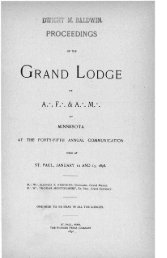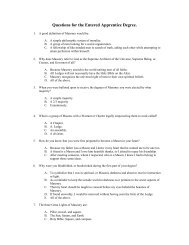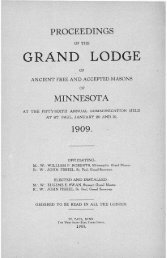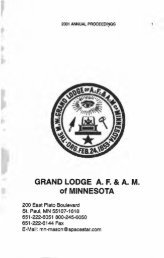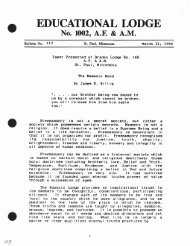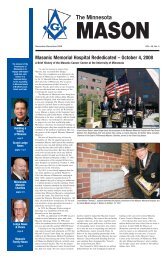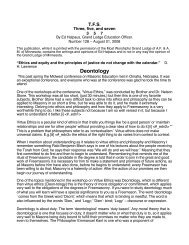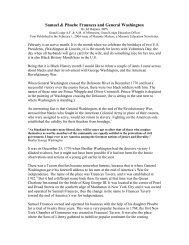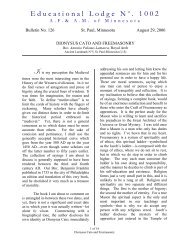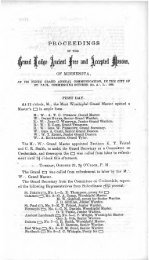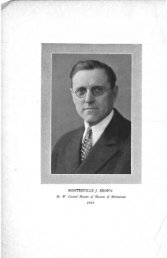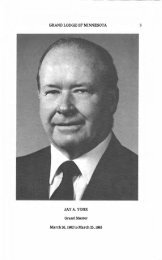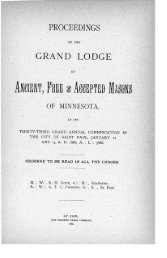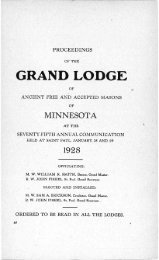T.F.S. #84 - The Grand Lodge of Minnesota
T.F.S. #84 - The Grand Lodge of Minnesota
T.F.S. #84 - The Grand Lodge of Minnesota
You also want an ePaper? Increase the reach of your titles
YUMPU automatically turns print PDFs into web optimized ePapers that Google loves.
T.F.S.<br />
Three, five, and seven<br />
3 5 7<br />
By Ed Halpaus, <strong>Grand</strong> <strong>Lodge</strong> Education Officer.<br />
Number 84 – October 01, 2006<br />
This publication, while it is printed with the permission <strong>of</strong> the Most Worshipful <strong>Grand</strong> <strong>Lodge</strong> <strong>of</strong> A.F. & A. M. <strong>of</strong> <strong>Minnesota</strong>,<br />
contains the writings and opinions <strong>of</strong> Ed Halpaus and is not in any way the opinion <strong>of</strong> the <strong>Grand</strong> <strong>Lodge</strong> <strong>of</strong> <strong>Minnesota</strong>.<br />
“Free Born: A free soul; one having attained mastery <strong>of</strong> himself by self discipline. It<br />
is a misconception that this refers to one not born into slavery.”<br />
From ‘Facts for Freemasons’ by Harold V.B. Vooris<br />
When it comes to the qualifications <strong>of</strong> a candidate, we learn in the first degree what the<br />
qualifications <strong>of</strong> a Freemason are; being a man, free born or lawful age and well<br />
recommended. However, we know that there is another qualification and that is to be a<br />
man who believes in a Supreme Being: In <strong>Minnesota</strong> the petition for the degrees <strong>of</strong><br />
Freemasonry asks; “Do you have a sincere belief and trust in God?”<br />
I think the qualifications <strong>of</strong> a Freemason are interesting to think about; especially the<br />
qualification about being Free Born. When I was first made a Mason and began to learn<br />
the first section <strong>of</strong> the lecture <strong>of</strong> the first degree, I asked about the phrase Free Born. <strong>The</strong><br />
answer I got, seemed to me, to be much less than satisfactory, and hardly acceptable in<br />
the way it was explained. Ever since then I have been interested in why we, as<br />
Freemasons, hang onto the phrase Free Born, instead <strong>of</strong> changing it to Free Man. <strong>The</strong><br />
United <strong>Grand</strong> <strong>Lodge</strong> <strong>of</strong> England in 1847 made the change from Free Born to Free Man,<br />
but as far as I know they are in the minority in making that change in the wording.<br />
When I think <strong>of</strong> the word or words Free Born I remember a phase I heard, long enough<br />
ago to forget where I heard it; “there is no shame in having been a slave, there is only<br />
shame in having been a slave owner.” Being born into slavery is not a choice; it is an<br />
accident <strong>of</strong> birth. As Brother A.S. McBride says in his book ‘Speculative Freemasonry’<br />
“A man may have been born a slave, yet attain his freedom and posses all the<br />
qualifications necessary for making a good Mason, why should he be excluded?” Brother<br />
McBride wrote this in 1924 when most men, who had been born into slavery, in the<br />
United States, would have been pretty old, but the question still is a good one. Brother<br />
Henry Wilson Coil wrote in his encyclopedia regarding the words Free Born and Free<br />
Man that if the requirement were only Free Born then a man born in slavery, even though<br />
free now, would be excluded under the qualifications <strong>of</strong> a petitioner, but a Bondsman<br />
would be eligible. However, using the term Free Man would not exclude a man born into<br />
slavery who had since gained his freedom, but would exclude a Bondsman.<br />
It might be appropriate here to include the dictionary’s definition <strong>of</strong> Bondsman: “A male<br />
Bond Servant.” <strong>The</strong> definition for Bondservant has the meaning <strong>of</strong> a slave or serf, also<br />
called a ‘Bondslave.’ <strong>The</strong>se definitions might be helpful when we think <strong>of</strong> a Bondsman<br />
or read about the philosophy <strong>of</strong> Brother Martin Delaney when it comes to the question <strong>of</strong><br />
Free Born.<br />
1
When it comes to reading and thinking about the phrase ‘Free Born’ I do like what our<br />
Brother Martin Delaney wrote on this subject. From a talk he delivered to St. Cyprian<br />
<strong>Lodge</strong> #13 on St. John the Baptist Day in 1853 he mentioned that ‘in many parts <strong>of</strong> the<br />
world, the people <strong>of</strong> various nations were subject to lose their liberty in several ways’; a<br />
forfeiture by crime, voluntary servitude [Bondsman] for a stipulated sum or reward, and<br />
capture in battle by which one could be sold into slavery. It was his opinion that those<br />
who voluntarily gave up their freedom, such as by committing and being convicted <strong>of</strong> a<br />
crime or being a bondsman, were ‘positively proscribed and utterly unworthy <strong>of</strong> its<br />
[Freemasonry’s] benefits.’ He said in his talk that ‘none but him who voluntarily<br />
[surrendered] his liberty was recognized as a slave by Masonry.’<br />
Regarding the third category, talking about slaves and their <strong>of</strong>fspring, he said; ‘You have<br />
the bold, the brave, the high-minded, the independent-spirit, and manly form <strong>of</strong> a kindred<br />
brother in humanity, whose heart is burning, whose breast is heaving, and whose soul is<br />
wrung with panting aspirations for liberty – a commander, a chieftain, a knight or a<br />
prince, it may be – still he is a captive and by the laws <strong>of</strong> captivity, a slave. Does<br />
Masonry, then, contemplate the withholding <strong>of</strong> its privileges from such applicants as<br />
these? Certainly not; since Moses, (to whom our great <strong>Grand</strong> Master Solomon, the<br />
founder <strong>of</strong> the temple, is indebted for his Masonic wisdom,) was born a slave, and lived<br />
in captivity eighty years and by the laws <strong>of</strong> his captors a slave. It matters not whether<br />
captured in actual conflict, sleeping by the wayside, or in a cradle <strong>of</strong> bulrushes, after<br />
birth, so that here be a longing aspiration for liberty, and manly determination to be free.<br />
Policy alone will not permit the order to confer Masonic privileges on one while yet in<br />
captivity; but the fact <strong>of</strong> his former conditions as such, or that <strong>of</strong> his parents, can have no<br />
bearing whatsoever on him. <strong>The</strong> mind and the desires <strong>of</strong> the recipient must be free; and<br />
at the time <strong>of</strong> his endowment with these privileges, his person and mind must be<br />
unencumbered with all earthly trammels or fetters.’<br />
From the above quoted portion <strong>of</strong> his talk; “Origin and Objects <strong>of</strong> Ancient Freemasonry:<br />
Its Introduction into the United States, and Legitimacy Among Colored Men,” we learn<br />
something about Brother Delaney’s philosophy on the question <strong>of</strong> whether the term Free<br />
Born should be taken literally or if it should be taken to mean Free Man, and some today<br />
ask whether to end the confusion, <strong>of</strong> the term, the ritual ought to be changed to Free Man.<br />
Occasionally Masons will sometimes hear another Mason comment about someone he<br />
knows saying; that he will check with [insert the name or title here] and if they say it is<br />
o.k. then he will join, [the Masons.] When I hear something like that reported I think<br />
about two things; one is that this doesn’t sound like someone coming to Masonry <strong>of</strong> his<br />
own free will and accord, and the other thing I think <strong>of</strong> is that it sounds like he’s<br />
abdicated his freedom to make a decision to someone else, and has therefore in some<br />
small way voluntarily surrendered his right to choose, at least on this question, to another.<br />
In any event it doesn’t sound, to me, like a Free Man making his own decisions.<br />
To read about Brother Martin Delaney is an enjoyable experience. He was a most<br />
remarkable man <strong>of</strong> great accomplishment. Information on him can be found on the<br />
Internet and also in ‘Black Square and Compass’ by Brother Joseph Walkes Jr.<br />
2
To learn more about the qualifications <strong>of</strong> petitioners see the section under that name and<br />
title in Coil’s Masonic Encyclopedia, it is quite extensive and interesting with<br />
information about all the Masonic Manuscripts. For instance, Brother Coil’s encyclopedia<br />
says all but the Regius Manuscript say Free Born; it [the Regius Manuscript] says instead<br />
‘No Bondsman,’ meaning free at the time <strong>of</strong> entering the fraternity.<br />
If you don’t have these books in your personal Masonic Library it is something you<br />
might want to consider, (it is a small investment for one involved in a lifelong study <strong>of</strong><br />
Freemasonry,) but do yourself a favor and read them in your <strong>Lodge</strong>’s Library if you don’t<br />
have your own copies. By the way, a <strong>Lodge</strong> making an investment in books for their<br />
library is a good thing for a <strong>Lodge</strong> to do. By having a wide variety <strong>of</strong> books in a <strong>Lodge</strong><br />
Library many Brethren can read, lean and enjoy, without each one building up his own<br />
personal library. A <strong>Lodge</strong> Library is a most cost effective way for Masons to learn about<br />
Freemasonry.<br />
“Man’s greatest power is his power to choose; to make his own decisions. No one should<br />
take that power away from him, and he should allow no one to do it.” Ed Halpaus<br />
More Light – Mehr Licht ©, Masonic Matters © and T.F.S. ©, are sent out by E-mail at no charge<br />
to anyone who would like to receive them. If you enjoy these publications please share them with<br />
others. To subscribe to any one or all <strong>of</strong> these publications just send an E-mail to<br />
ed@halpaus.net with Subscribe and the Title, or ‘all 3,’ in the subject line and you will be added<br />
to the list to receive the publication you want.<br />
“<strong>The</strong> throne we honor is the people’s choice.” Richard Brinsley Sheridan<br />
Sacramentum fidelitatis = [Latin] = <strong>The</strong> oath <strong>of</strong> fealty<br />
From the Great Light <strong>of</strong> Masonry: “<strong>The</strong> Lord did not set his affection on you and choose you<br />
because you were more numerous than other peoples, for you were the fewest <strong>of</strong> all<br />
peoples. But it was because the Lord loved you and kept the oath he swore to your<br />
forefathers that he brought you out with a mighty hand and redeemed you from the land <strong>of</strong><br />
slavery.” Deuteronomy 7:7&8 NIV<br />
Take a look at the Masonic Monday Question at: www.mn-masons.org/gleo<br />
With “Brotherly Love”,<br />
Ed Halpaus<br />
<strong>Grand</strong> <strong>Lodge</strong> Education Officer<br />
3



